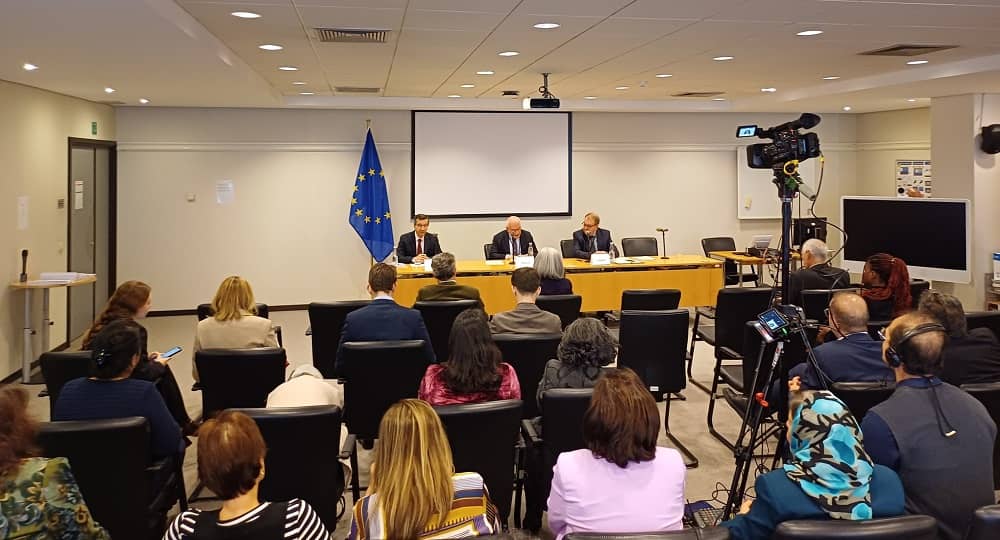
On January 23, 2024, Spanish MEP Javier Zarzalejos presented a comprehensive report during a meeting held at the European Parliament in Brussels. The report, titled ‘Tracing Iran’s Web of Influence in European Politics,’ sheds light on Iran’s covert attempts to influence European politics. It exposes the Iranian regime’s manipulation of political discourse through individuals who masquerade as experts.
These individuals, affiliated with the Iran Experts Initiative (IEI), were revealed to have ties with the Iranian foreign ministry, influencing analyses and recommendations relied upon by European governments and institutions.
The leaked emails, spanning from 2003 to 2021, demonstrate the Iranian regime’s efforts to infiltrate Western policy circles and media outlets. The operation, directed by Iranian officials, involves cultivating relationships with overseas academics and researchers to propagate Iran’s narratives in international policy forums and the media. Notably, the report points out that some of these academics later ascended to prominent positions in the US government and European think-tanks, subtly influencing policy decisions from within.
The IEI, created in 2014, strategically positioned Iranian analysts within Western think tanks to advance Iran’s diplomatic goals, particularly regarding its nuclear program. The report raised concerns about the involvement of senior officials from the Biden administration and EU officials in this strategic positioning. The Iranian regime’s tactics include demonizing the democratic opposition, especially the National Council of Resistance of Iran (NCRI), while promoting a false image of a moderate faction within the theocratic regime in Iran.
Live right now:
An event on Countering foreign interference: Tracing Iran’s web of influence in European Politics.
It’s a presentation of a report titled: ‘Tracing Iran’s Web of Influence in European Politics’, prefaced by MEP Javier Zarzalejos. pic.twitter.com/UBxqSoQ1yt— Friends of a Free Iran – EP (@FOFI_EP) January 23, 2024
During a press conference, MEP Javier Zarzalejos, co-president of the Intergroup of Friends of a Free Iran (FOFI), emphasized the need to protect European democracy from foreign interference, especially as elections approach. He highlighted the FOFI’s role in revealing email exchanges between Iran experts and officials of the Iranian Ministry of Foreign Affairs, leading to concerns about those shaping policies against Iran being part of a network set up by Iran.
Hoy en la biblioteca del @Europarl_ES hemos presentado el informe ‘Tracing Iran’s web of influence in European Politics’ que pone de manifiesto la red de influencia desplegada por el régimen iraní para influir en la política europea y demonizar a la oposición en el exilio. 1/2 pic.twitter.com/mo1DHX7y76
— F. Javier Zarzalejos Nieto (@FZarzalejos) January 23, 2024
Zarzalejos called for a deeper understanding of the mechanisms through which foreign governments exert influence and stressed the importance of transparency, vigilance, and accountability. The report concludes with a call for European governments and institutions, including the EU, to reconsider their policies on Iran in light of these revelations.
Additionally, during an event on countering foreign interference, Struan Stevenson explained the “Iran Experts Initiative,” exposing the Iranian regime’s influence in EU politics.
ISJ's @STRUANSTEVENSON speaking at a European Parliament meeting exposing #IEI Iran's attempt to influence European Politics.
Other speakers @FZarzalejos & Farzin Hashemi#FreeIran2024 #HumanRights #blacklistIRGC pic.twitter.com/gHsWM9GFh1— International Committee in Search of Justice (@isjcommittee) January 23, 2024
Farzin Hashemi from the NCRI highlighted the regime’s creation of fake NGOs and so-called experts to spread its narrative and promote the false notion of a moderate faction within the regime.
Brussels. Meeting in European Parliament
Tracing Iran's web of influence in European Politics
Speakers: @FZarzalejos @STRUANSTEVENSON & Farzin Hashemi#FreeIran2024 #mek #HumanRights pic.twitter.com/zMK6uP2ztx— Firouz Mahvi (@FirouzMahvi) January 23, 2024
The speakers urged the EU to listen to the voices of the Iranian people and recognize their right to defend themselves against the threats posed by the IRGC.